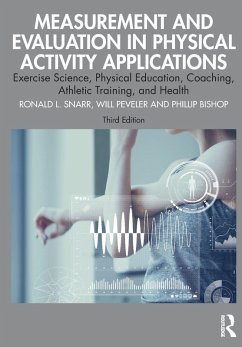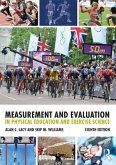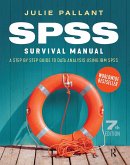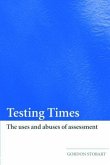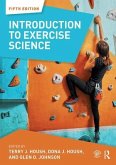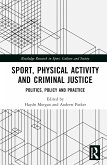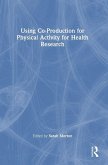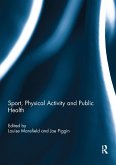Ronald L. Snarr, Will Peveler, Phillip Bishop (USA University of Alabama)
Measurement and Evaluation in Physical Activity Applications
Exercise Science, Physical Education, Coaching, Athletic Training, and Health
Ronald L. Snarr, Will Peveler, Phillip Bishop (USA University of Alabama)
Measurement and Evaluation in Physical Activity Applications
Exercise Science, Physical Education, Coaching, Athletic Training, and Health
- Broschiertes Buch
- Merkliste
- Auf die Merkliste
- Bewerten Bewerten
- Teilen
- Produkt teilen
- Produkterinnerung
- Produkterinnerung
This book offers a student-friendly introduction to the principles and practice of measurement and evaluation. Spanning applications in exercise science, sport performance, physical education, coaching, training, health, and physical/occupational therapy, the book includes chapters on the key principles underlying good measurement practice.
Andere Kunden interessierten sich auch für
![Measurement and Evaluation in Physical Education and Exercise Science Measurement and Evaluation in Physical Education and Exercise Science]() Skip M. WilliamsMeasurement and Evaluation in Physical Education and Exercise Science104,99 €
Skip M. WilliamsMeasurement and Evaluation in Physical Education and Exercise Science104,99 €![SPSS Survival Manual SPSS Survival Manual]() Julie PallantSPSS Survival Manual188,99 €
Julie PallantSPSS Survival Manual188,99 €![Testing Times Testing Times]() Gordon Stobart (Institute of Education, University of London, UK)Testing Times58,99 €
Gordon Stobart (Institute of Education, University of London, UK)Testing Times58,99 €![Introduction to Exercise Science Introduction to Exercise Science]() Introduction to Exercise Science81,99 €
Introduction to Exercise Science81,99 €![Sport, Physical Activity and Criminal Justice Sport, Physical Activity and Criminal Justice]() Sport, Physical Activity and Criminal Justice151,99 €
Sport, Physical Activity and Criminal Justice151,99 €![Using Co-Production for Physical Activity for Health Research Using Co-Production for Physical Activity for Health Research]() Using Co-Production for Physical Activity for Health Research189,99 €
Using Co-Production for Physical Activity for Health Research189,99 €![Sport, Physical Activity and Public Health Sport, Physical Activity and Public Health]() Sport, Physical Activity and Public Health55,99 €
Sport, Physical Activity and Public Health55,99 €-
-
-
This book offers a student-friendly introduction to the principles and practice of measurement and evaluation. Spanning applications in exercise science, sport performance, physical education, coaching, training, health, and physical/occupational therapy, the book includes chapters on the key principles underlying good measurement practice.
Produktdetails
- Produktdetails
- Verlag: Taylor & Francis Ltd
- 3 ed
- Seitenzahl: 304
- Erscheinungstermin: 9. November 2025
- Englisch
- Abmessung: 244mm x 170mm x 16mm
- Gewicht: 534g
- ISBN-13: 9781032719498
- ISBN-10: 1032719494
- Artikelnr.: 71848039
- Herstellerkennzeichnung
- Libri GmbH
- Europaallee 1
- 36244 Bad Hersfeld
- gpsr@libri.de
- Verlag: Taylor & Francis Ltd
- 3 ed
- Seitenzahl: 304
- Erscheinungstermin: 9. November 2025
- Englisch
- Abmessung: 244mm x 170mm x 16mm
- Gewicht: 534g
- ISBN-13: 9781032719498
- ISBN-10: 1032719494
- Artikelnr.: 71848039
- Herstellerkennzeichnung
- Libri GmbH
- Europaallee 1
- 36244 Bad Hersfeld
- gpsr@libri.de
Ronald L. Snarr, PhD, is an Associate Professor of Exercise Science at Texas A&M University- Corpus Christi, USA. His research interests include high-intensity interval training, instability training, electromyography, body composition, and adapted and tactical athlete performance. He has published more than 90 peer-reviewed manuscripts, is the author of Foundations of Scientific Writing for Kinesiology, co-editor of the Third Edition of the NSCA's Essentials of Personal Training, and has presented at multiple international, national, and regional conferences. He is a Fellow of the American College of Sports Medicine (ACMS), Certified Strength and Conditioning Specialist (CSCS,*D), Certified Personal Trainer (NSCA-CPT*D), Tactical Strength and Conditioning Facilitator (TSAC-F*D), and Certified Exercise Physiologist (EP-C), and he has 15+ years of experience working with athletes at the Olympic, professional, and collegiate levels. Will Peveler, PhD, serves as a Professor in Exercise Science at Liberty University, Lynchburg, Virginia, USA, with more than 20 years of teaching experience. His field of study is exercise science, and he has specialized in this area with a focus on physiological and biomechanical factors that affect human performance in both sports performance and combat operations. He has an extensive background in the sports of cycling, running, triathlon, and mixed martial arts. Phillip Bishop, PhD, is the Emeritus Professor of Exercise Science at the University of Alabama, Tuscaloosa, USA. During his 33 years as a university teacher, he has published more than 200 refereed papers, delivered more than 400 professional presentations, and chaired 52 PhD dissertations, while providing an excellent foundation for writing on applied statistics. Currently, he works for Cru, traveling around the USA and the world and speaking on professional and spiritual topics.
1. Measurement and Evaluation for Your Personal and Professional Life
2. The Challenge of Good Measurement: Validity
3. Additional Challenges of Good Measurement: Reliability and Objectivity
4. Understanding Validity
5. Evaluating Validity: Introduction to Statistics
6. Evaluating Validity: T-Tests and Correlations
7. Evaluating Validity for Ordinal Measures, and Error Analysis
8. Evaluating the Validity of Criterion-Referenced Measures
9. Understanding, Calculating, and Evaluating Reliability
10. Understanding, Calculating, and Evaluating Objectivity
11. Devising Measurements
12. Evaluating New Measurements
13. Numbers and Statistics in Measurement
14. Standard Scores
15. Practical Inferential Statistics
16. Misusing Statistics
17. Measuring In Quantitative Research
18. Qualitative Research and Reading Research
19. Measuring Physical Fitness
20. Measuring Body Composition and Range of Motion, and Administering Tests
21. Measuring Exercise and Physical Activity
22. Measuring Health
23. Measuring Psychomotor Performance and Sports Skills
24. Measuring Skills with Rubrics
25. Measuring in Sports and Coaching
26. Alternative Approaches to Measurement and Subjective Measurement
27. Measuring the Affective Domain
28. Measuring and Evaluating Knowledge
29. Creating and Evaluating Cognitive Tests no references
30. Grading
2. The Challenge of Good Measurement: Validity
3. Additional Challenges of Good Measurement: Reliability and Objectivity
4. Understanding Validity
5. Evaluating Validity: Introduction to Statistics
6. Evaluating Validity: T-Tests and Correlations
7. Evaluating Validity for Ordinal Measures, and Error Analysis
8. Evaluating the Validity of Criterion-Referenced Measures
9. Understanding, Calculating, and Evaluating Reliability
10. Understanding, Calculating, and Evaluating Objectivity
11. Devising Measurements
12. Evaluating New Measurements
13. Numbers and Statistics in Measurement
14. Standard Scores
15. Practical Inferential Statistics
16. Misusing Statistics
17. Measuring In Quantitative Research
18. Qualitative Research and Reading Research
19. Measuring Physical Fitness
20. Measuring Body Composition and Range of Motion, and Administering Tests
21. Measuring Exercise and Physical Activity
22. Measuring Health
23. Measuring Psychomotor Performance and Sports Skills
24. Measuring Skills with Rubrics
25. Measuring in Sports and Coaching
26. Alternative Approaches to Measurement and Subjective Measurement
27. Measuring the Affective Domain
28. Measuring and Evaluating Knowledge
29. Creating and Evaluating Cognitive Tests no references
30. Grading
1. Measurement and Evaluation for Your Personal and Professional Life
2. The Challenge of Good Measurement: Validity
3. Additional Challenges of Good Measurement: Reliability and Objectivity
4. Understanding Validity
5. Evaluating Validity: Introduction to Statistics
6. Evaluating Validity: T-Tests and Correlations
7. Evaluating Validity for Ordinal Measures, and Error Analysis
8. Evaluating the Validity of Criterion-Referenced Measures
9. Understanding, Calculating, and Evaluating Reliability
10. Understanding, Calculating, and Evaluating Objectivity
11. Devising Measurements
12. Evaluating New Measurements
13. Numbers and Statistics in Measurement
14. Standard Scores
15. Practical Inferential Statistics
16. Misusing Statistics
17. Measuring In Quantitative Research
18. Qualitative Research and Reading Research
19. Measuring Physical Fitness
20. Measuring Body Composition and Range of Motion, and Administering Tests
21. Measuring Exercise and Physical Activity
22. Measuring Health
23. Measuring Psychomotor Performance and Sports Skills
24. Measuring Skills with Rubrics
25. Measuring in Sports and Coaching
26. Alternative Approaches to Measurement and Subjective Measurement
27. Measuring the Affective Domain
28. Measuring and Evaluating Knowledge
29. Creating and Evaluating Cognitive Tests no references
30. Grading
2. The Challenge of Good Measurement: Validity
3. Additional Challenges of Good Measurement: Reliability and Objectivity
4. Understanding Validity
5. Evaluating Validity: Introduction to Statistics
6. Evaluating Validity: T-Tests and Correlations
7. Evaluating Validity for Ordinal Measures, and Error Analysis
8. Evaluating the Validity of Criterion-Referenced Measures
9. Understanding, Calculating, and Evaluating Reliability
10. Understanding, Calculating, and Evaluating Objectivity
11. Devising Measurements
12. Evaluating New Measurements
13. Numbers and Statistics in Measurement
14. Standard Scores
15. Practical Inferential Statistics
16. Misusing Statistics
17. Measuring In Quantitative Research
18. Qualitative Research and Reading Research
19. Measuring Physical Fitness
20. Measuring Body Composition and Range of Motion, and Administering Tests
21. Measuring Exercise and Physical Activity
22. Measuring Health
23. Measuring Psychomotor Performance and Sports Skills
24. Measuring Skills with Rubrics
25. Measuring in Sports and Coaching
26. Alternative Approaches to Measurement and Subjective Measurement
27. Measuring the Affective Domain
28. Measuring and Evaluating Knowledge
29. Creating and Evaluating Cognitive Tests no references
30. Grading

